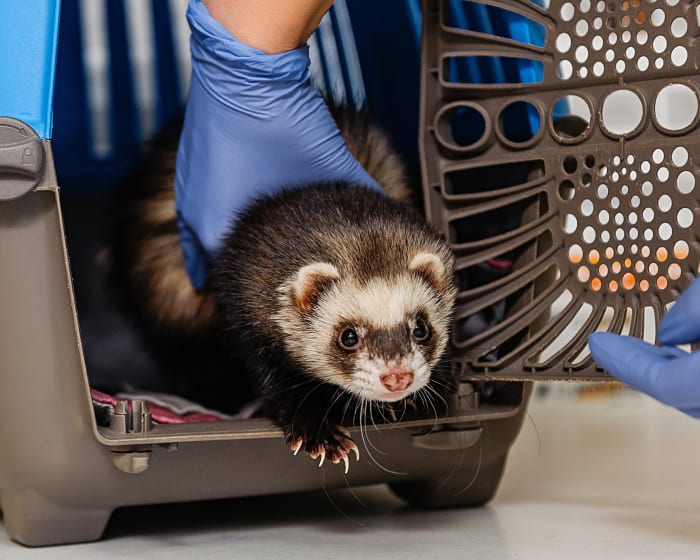
Quality Care for Birds, Reptiles & Small Mammals in Nashua
We know that caring for your exotic pet requires special knowledge and experience. Rest assured, your furry, scaly, or feathered friends are in good hands with us.
Our veterinarians, Dr. Shannon Kircher and Dr. Jonathan McCarthy, are dedicated to providing birds, reptiles, and small mammals in Nashua with proper care so they can have long and healthy lives.
FAQs for Care of Exotic Pets
At Animal Medical Center of New England, we offer routine wellness and preventive care for your bird or other exotic pet. Additionally, our team can assess exotic pets for unexpected medical issues or behavioral concerns.
-
What is the avian species?
The avian species involves any and all things in relation to birds. These small, exotic animals have become popular pets for people looking for intelligent, affectionate companions with lots of personality.
Many birds are prey species in the wild and may hide signs of illness as a defense mechanism against predators, which makes consistent, qualified preventive veterinary care essential for their health and well-being.
At Animal Medical Center of New England, we are able to treat most species of birds, excluding those that are of a raptor species.
-
What should I do if my bird is sick?
If your bird becomes sick, there are several things you can do to help them regain their health, including making sure they are eating and drinking properly.
Keep sick birds separate from other pets and ensure they stay warm. We also suggest putting birds that are ill on cage rest during their recovery to reduce stress, and providing about 12 hours of light and 12 hours of darkness each day.
Take your bird to the veterinarian for an exam if your avian friend shows signs of illness. Seriously ill birds will need to be hospitalized, while those that are only mildly sick or still eating and drinking can be treated at home under a veterinarian's guidance.
-
What characteristics do reptiles and amphibians have?
Reptiles and amphibians attract many people who want something different from the usual furry pet. They need specialized environments and preventive care to thrive.
Animals like turtles, snakes, lizards, iguanas, and tortoises fall under the reptile classification. These air-breathing vertebrates are covered in a specialized skin made of hard scales, bony plates, or some combination of the two.
Amphibians include frogs, toads, salamanders, newts, and worm-like caecilians. These cold-blooded vertebrates lack scales. They spend part of their lives in water and part on land.
Your veterinarian can provide you with more information about these animals' unique dietary and housing requirements.
-
What housing needs do exotic mammals have?
Exotic mammals require special care and behavior considerations, so potential owners should verify local laws and regulations before purchasing.
For example, ferrets have earned a reputation as escape artists, so they should be housed in a large, well-ventilated cage that is securely closed and locked. These intelligent, curious, and socially interactive animals need a 'ferret-proof' play area or room to explore and investigate safely under supervision.
A hedgehog's large, escape-proof cage should be placed away from direct sunlight, cold spots, or drafts. Since hedgehogs have sharp quills, handling them can be challenging, and they require consistent, proper care.
Talk to your vet about your specific pet's housing, nutritional, social, and preventive healthcare needs.
-
What can I expect at my exotic pet's veterinary appointment?
When you bring your exotic pet in for an appointment, the veterinarian will perform a comprehensive routine exam to evaluate your pet's overall health.
We'll recommend appropriate preventive care, perform any required tests, and answer any questions you may have about at-home care.
Exotics We Treat
At Animal Medical Center of New England, we provide dedicated veterinary care for many types of exotic pets, including:
Small Exotic Mammals
Rodents, guinea pigs, rabbits, hedgehogs, and chinchillas.
Birds (Avians)
Budgies, parrots, conures, and pigeons.
Note: We do not treat birds that are of a raptor species.
Amphibians
Frogs, axolotls, and salamanders.
Reptiles
Turtles, snakes, and lizards.

